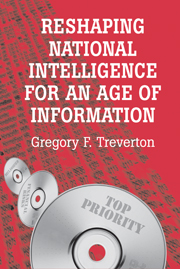Book contents
- Frontmatter
- Contents
- Foreword
- Preface
- Note on sources
- 1 The imperative of reshaping
- 2 The world of intelligence beyond 2010
- 3 The militarization of intelligence
- 4 Designated readers: the open source revolution
- 5 Spying, looking, and catching criminals
- 6 The intelligence of policy
- 7 A reshaped intelligence
- Index
Preface
Published online by Cambridge University Press: 23 May 2010
- Frontmatter
- Contents
- Foreword
- Preface
- Note on sources
- 1 The imperative of reshaping
- 2 The world of intelligence beyond 2010
- 3 The militarization of intelligence
- 4 Designated readers: the open source revolution
- 5 Spying, looking, and catching criminals
- 6 The intelligence of policy
- 7 A reshaped intelligence
- Index
Summary
When I took over the national estimates process as vice chair of the National Intelligence Council (NIC) at the beginning of the first Clinton administration, I had been a Senate investigator of intelligence, a White House consumer of intelligence, and an academic student of intelligence. But this was my first time in what is called, slightly quaintly, the “intelligence community.” As with other such locutions in life, the word community describes precisely what it is not; it is somewhere between a fiction and an aspiration.
I vowed that I would stay only as long as I could laugh at aspects of the organizational culture in which the NIC worked — we took bed and board from the Central Intelligence Agency (CIA) at its headquarters in Langley, Virginia — that struck me as Cold War throwbacks, such as the fact that my daily schedule, neatly typed and frequently revised each day, was classified “secret.” I never did figure out why it was so classified, but I did leave, for other reasons, about the time I stopped laughing.
More to the point, I felt like the candidate member of a priesthood, with both the positive and the negative connotations of that label. Positively, the CIA analysts who were my most immediate colleagues and helpers reinforced the impression I had formed of them in earlier executive programs I had taught: they made me proud of the public service.
- Type
- Chapter
- Information
- Reshaping National Intelligence for an Age of Information , pp. xiii - xviPublisher: Cambridge University PressPrint publication year: 2001

